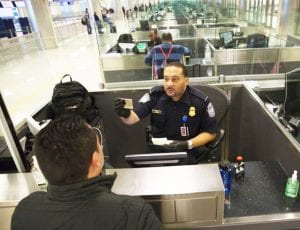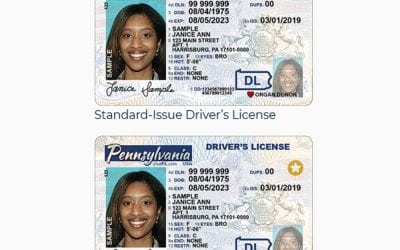U.S. Customs and Border Protection inspects travelers’ laptops and cellphones when they enter the U.S. I have five tips to maintain digital privacy.
 U.S. Customs and Border Protection (CBP) has been inspecting U.S. citizens’ and international travelers’ laptops, tablets, and mobile phones at U.S. border entry points, violating digital privacy. Sometimes, they confiscate them for days, weeks, or even months to perform detailed inspections. They have conducted and continue to conduct the inspections without warrants or suspicion of wrongdoing.
U.S. Customs and Border Protection (CBP) has been inspecting U.S. citizens’ and international travelers’ laptops, tablets, and mobile phones at U.S. border entry points, violating digital privacy. Sometimes, they confiscate them for days, weeks, or even months to perform detailed inspections. They have conducted and continue to conduct the inspections without warrants or suspicion of wrongdoing.
A 2017 lawsuit was brought by the Electronic Frontier Foundation (EFF) and the ACLU against the Department of Homeland Security. In fiscal 2018, CBP agents are thought to have conducted about 30,000 searches of electronic devices in violation of digital privacy. The searches include examining mobile phones, tablets, and computers, etc. According to CBP data, they conducted about 8,500 such searches at the border in fiscal 2015.
Border inspections of travelers’ electronic devices to review their digital privacy has increased by 57 percent since 2018.
By fiscal 2024, CBP states that it inspected about 47,000 electronic devices at the U.S. border. In the seven years from 2018, that’s a 57 percent increase in searches of electronic devices.
While it’s a small percentage of the 420 million travelers who entered the U.S. that year, don’t tell that to the people who had their private information laid bare to CBP agents, including family photos, private work data and personal health information, social media posts, personal passwords to banking and other financial accounts, private legal messages piercing attorney-client privilege and private messages with family and friends, etc.
CBP apparently has no idea of how many of their warrantless searches have yielded evidence of criminal or terrorist activity.
Astonishingly, CBP apparently doesn’t know how many of those warrantless searches have uncovered potential evidence of criminal or terrorist activity.
While in the U.S., citizens and foreign nationals are supposed to be protected by the Fourth Amendment of the U.S. Constitution, from unreasonable governmental searches and seizures. CBP argues that the border is a special case, compared to the nation at large, because there are national security interests at stake.
China also routinely requires travelers at its border to turn over their electronic devices for inspection and data review.
 According to an investigative report from the New York Times, China is routinely requiring travelers at some of its border to turn over their personal data. Mobile phones and other electronic devices are elected for inspection, copying and reviewing their digital privacy.
According to an investigative report from the New York Times, China is routinely requiring travelers at some of its border to turn over their personal data. Mobile phones and other electronic devices are elected for inspection, copying and reviewing their digital privacy.
China doesn’t reveal details about their electronic device inspection program. But there are multiple reports that Chinese border agents connect iPhones to USB cables to download their data for review. It’s also been reported that they install Fengcai, a spy app, on Android based phones. The app scans user text messages, contacts and checks photos, videos, documents and audio. Before they’re returned, Chinese border agents photograph each visitor with their device and passport.
Travelers have taken a paranoid approach to crossing Russian and Chinese borders. It looks like they need to now do the same at U.S. borders to maintain digital privacy.
For decades, travelers have taken an almost paranoid approach to crossing the borders of Russia and China. Now it would seem that the U.S. must be added to the list. This day has been coming for some time, as the current Trump Administration may be considerably more aggressive at the U.S. border, inspecting electronic devices of both foreign nationals and U.S. citizens. Don’t forget that those 47,000 devices inspected in fiscal 2024 were all seized and examined under the Biden Administration.
Even U.S. attorneys aren’t immune from CBP electronic device inspections at the U.S. border.
Even U.S. citizens who are attorneys aren’t immune from having CBP agents pull them aside at the U.S. border. They demand access to their mobile phones. Just ask Detroit civil rights attorney, Amir Makled. Returning home from the Dominican Republic, he said that while he was detained for roughly 90 minutes at the Detroit Metro Airport CBP agents pressured him to give them access to his mobile phone. It contained work product that was subject to attorney-client privilege. Makled believes they stopped him because he is representing a pro-Palestinian protester. That the government would try an end run to pierce attorney-client privilege is a serious Constitutional breach.
Australia and New Zealand have joined the U.S., China and other nations in examining travelers’ “electronic lives” at their borders.
There are measures that travelers can take to protect their digital privacy. Here are my travel electronics device privacy tips for international travelers at border inspection:
To minimize the impact of CBP inspection on your life, sanitize your devices before crossing the U.S. border, lock them, and encrypt them when possible.
Sanitize your device:
It may seem drastic to some travelers, but after you back up everything on your electronic devices, delete all non-essential information on your mobile phone, tablet, and laptop that you won’t need while traveling. That includes messages, documents, emails, bookmarks, contacts, calendar, and even apps and their data.
Lock it; encrypt it:
On your laptop, tablet and mobile phone, don’t make it easy for CBP to view/copy your data by making their entry into your device easy. My laptop computer uses a complex, lengthy passphrase to gain entry to its encrypted hard drive. On my tablet and mobile phone I use a six-digit pin, not an easy-to-break four-digit pin. I turn off Face ID and disable Siri access when the iPhone is locked. If my devices used a fingerprint ID, I’d turn it off, too. Apparently, CBP can compel you to biometrically unlock your phone, but they can’t force you to reveal a password or passphrase.
Make sure all your devices are off when entering the U.S. That way CBP will be forced to use the password/passphrase to unlock them.
Be aware that if you cannot refuse to give up your passwords/passphrases, as a U.S. citizen you’ll likely be detained for a while by CBP. Your electronic devices will likely be confiscated for a time. It’s unlikely you’ll go home with them. If you’re not a U.S. national, CBP will probably refuse entry to the U.S. if you don’t allow them access.
To keep private data off your electronic devices, connect to and use your home or office computer remotely so that your data will never be on the devices with which you’re traveling.
Get your email and data as well as surf the web remotely, as needed:
When traveling internationally, remotely connect to and use your home/office computer through a VPN (virtual private network) connection. I use a subscription service so it’s easy to connect this way. When connected remotely, my emails, documents, web surfing, etc. are never on my laptop. If my laptop is examined at the border, there’s nothing of value on it for CBP agents to see or for me to lose.
Think about using a travel smartphone with minimal data while on the go internationally. Store sensitive but important data that you may need in the cloud so it’s not on your devices.
Consider a travel smartphone:
More than a few frequent international travelers I know own a second smartphone for use while traveling internationally. They’ve taken advantage of those two-for-one smartphone special offers that cell providers often advertise. They keep their travel smartphone “clean,” only keeping a minimal amount of information on it, that’s essential to their travel.
Use the cloud:
For documents you might need while traveling that normally would be stored on your cellphone or laptop, store them on the cloud for access. Use the Internet while on the go. If you have to store them temporarily while on the go, delete them from your device immediately after using them. Always use a secure VPN connection to download documents.
When traveling internationally, visitors should understand that if you refuse access to your electronic devices, you’ll likely be refused entry to the country you want to visit and sent home, possibly after time in detention. If your electronic devices are “clean,” rather than ruin your trip, consider allowing government agents to review your data, since there would be nothing of value for them.

READ ALSO:
Stealing from your hotel room?
Hotel room safety? It’s on you any time you travel!
After many years working in corporate America as a chemical engineer, executive and eventually CFO of a multinational manufacturer, Ned founded a tech consulting company and later restarted NSL Photography, his photography business. Before entering the corporate world, Ned worked as a Public Health Engineer for the Philadelphia Department of Public Health. As a well known corporate, travel and wildlife photographer, Ned travels the world writing about travel and photography, as well as running photography workshops, seminars and photowalks. Visit Ned’s Photography Blog and Galleries.



